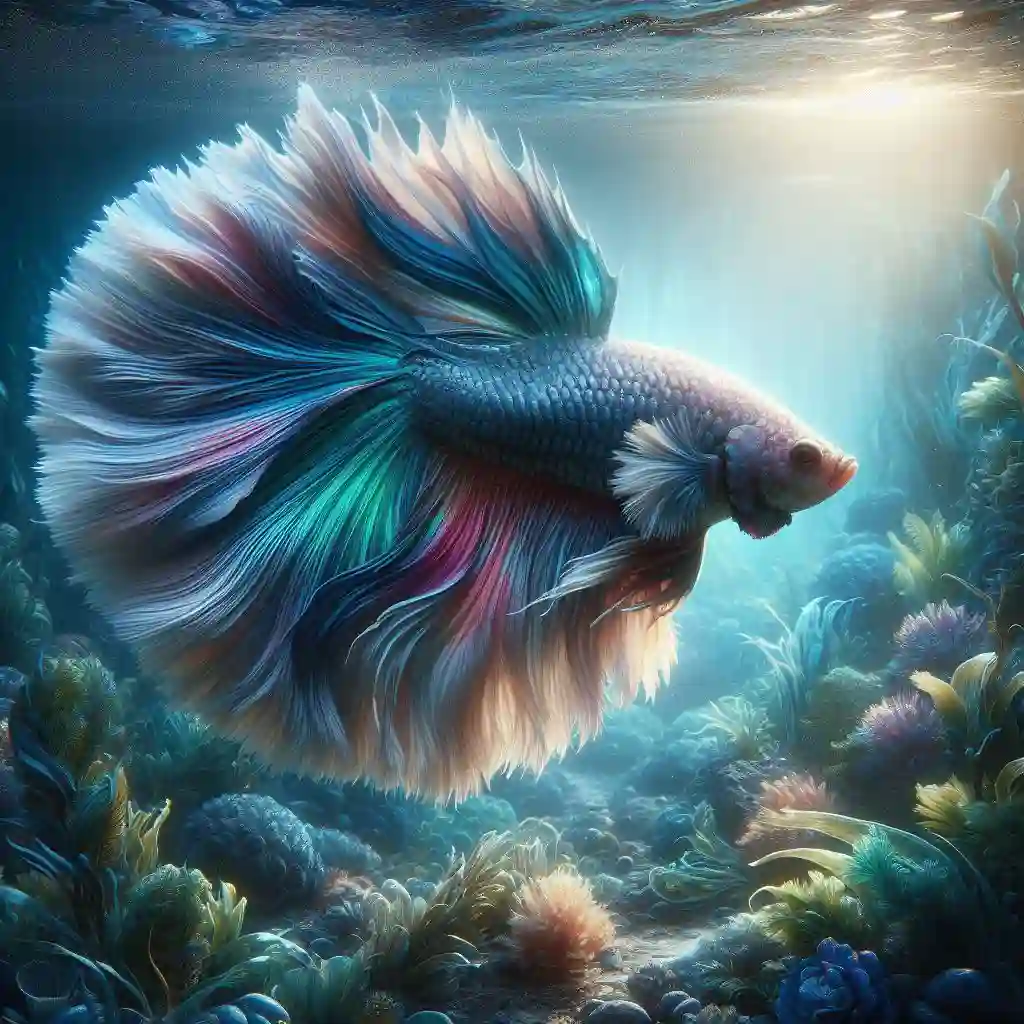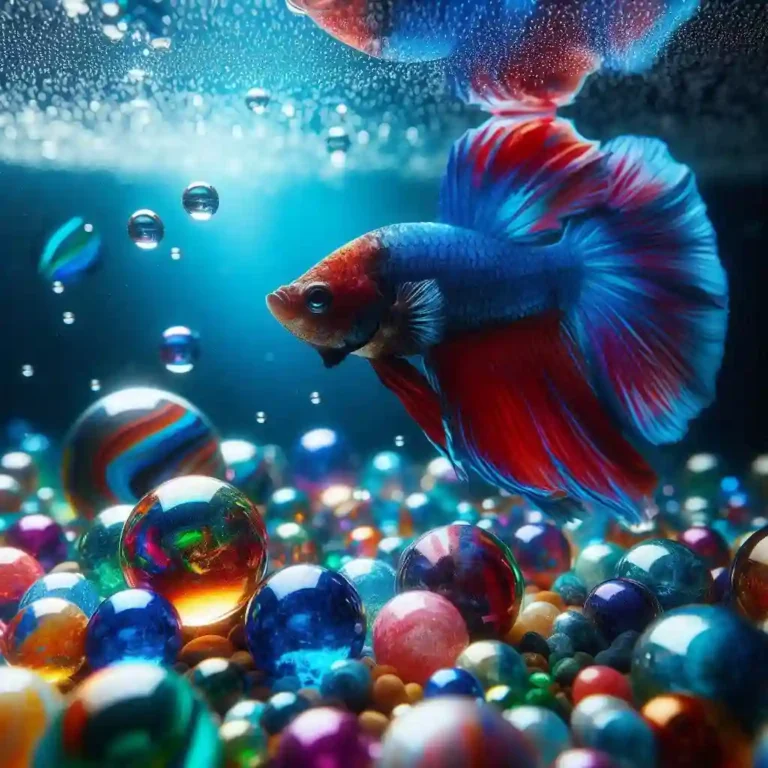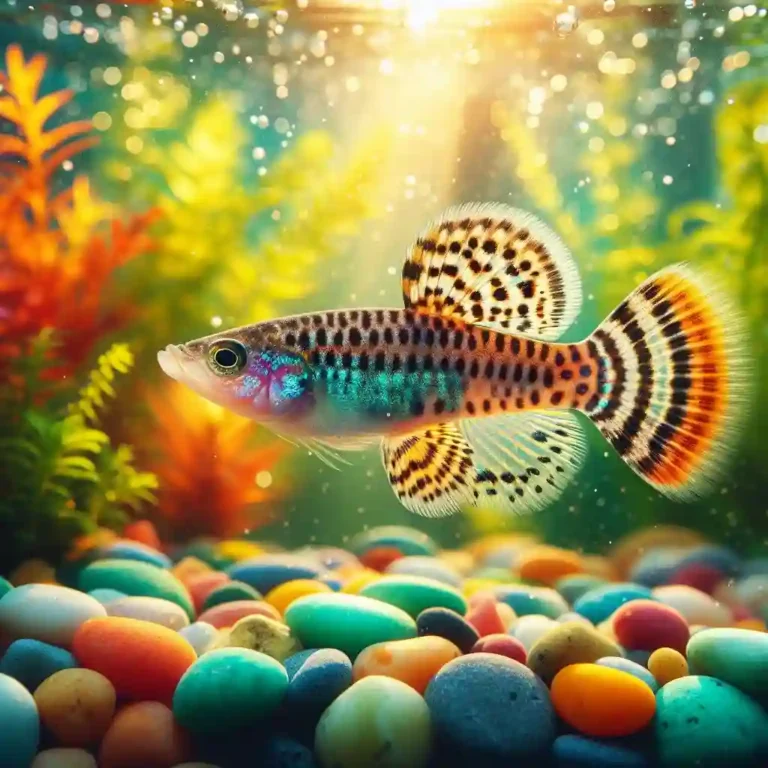Betta Fish Not Eating: Is It a Sign of a Bigger Problem?
Betta Fish Not Eating: A loss of appetite in betta fish can be a sign of a underlying issue, and if left unchecked, can lead to malnutrition, weakened immunity, and even death.
But don’t panic just yet! In most cases, a betta fish not eating is a treatable condition, and with a little detective work, you can identify the root cause and get your pet back to its usual self.
In this article, we’ll delve into the common reasons why your betta fish might not be eating, from environmental factors to medical conditions.
Betta Fish Not Eating: A Quick Guide

Step 1: Check the Water Quality
- Check the water temperature, pH, and ammonia levels to ensure they are within the ideal range for your betta fish.
- Make sure the tank is clean and free of debris.
Step 2: Check the Food
- Check the expiration date of the food and make sure it is fresh.
- Try feeding your betta fish live or frozen foods, such as brine shrimp or bloodworms.
Step 3: Check for Stress
- Check for signs of stress, such as rapid breathing, labored swimming, or hiding.
- Make sure the tank is well-maintained and free of stressors.
Step 4: Check for Health Issues
- Check for signs of illness, such as labored breathing, lethargy, or loss of appetite.
- Consult a veterinarian or a qualified aquarium expert for a proper diagnosis and treatment.
Step 5: Try a Different Food
- Try feeding your betta fish a different type of food to see if that makes a difference.
- You can also try feeding them a varied diet that includes a mix of pellets and flakes.
Step 6: Consult a Veterinarian
- If your betta fish is still not eating, consult a veterinarian or a qualified aquarium expert for a proper diagnosis and treatment.
Stress and Environmental Factors: Is Your Betta Feeling Anxious?
Common Stressors in the Aquarium
- Tank Size and Shape: A small or irregularly shaped tank can cause your betta to feel cramped and anxious.
- Water Changes: Frequent or inadequate water changes can lead to stress, as your betta adjusts to new water conditions.
- Tank Mates: Aggressive or fin-nipping tank mates can cause your betta to feel threatened and stressed.
- Decorations and Hiding Places: A lack of hiding places or decorations can make your betta feel exposed and vulnerable.
- Noise and Vibrations: Loud noises or vibrations from nearby appliances can disturb your betta’s peaceful environment.
- Changes in Lighting: Sudden changes in lighting, such as switching from low to high-intensity lighting, can cause stress.
- Over-Handling: Handling your betta too frequently or roughly can cause stress and anxiety.
Signs of Stress in Betta Fish
- Rapid breathing or gasping
- Erratic swimming or darting
- Hiding or avoiding food
- Fins held close to the body
- Lethargy or loss of appetite
Reducing Stress in the Aquarium
- Provide a Suitable Environment: Ensure your tank is large enough (at least 5 gallons) and well-filtered.
- Maintain a Consistent Routine: Establish a regular schedule for water changes, feeding, and tank maintenance.
- Add Hiding Places and Decorations: Incorporate plants, rocks, and ornaments to create hiding spots and visual interest.
- Choose Compatible Tank Mates: Select peaceful, small, and non-aggressive tank mates.
- Minimize Noise and Vibrations: Place your tank in a quiet area, away from loud appliances and foot traffic.
- Monitor Water Quality: Regularly test water parameters and make adjustments as needed.
Water Quality Issues: Is Your Betta’s Home Making Them Sick?

Common Water Quality Issues
- Ammonia Poisoning: High levels of ammonia can cause respiratory distress, lethargy, and a loss of appetite.
- Nitrite Poisoning: Nitrite buildup can lead to brown blood disease, causing lethargy, rapid breathing, and a decrease in appetite.
- Nitrate Buildup: High nitrate levels can cause algae growth, leading to poor water quality and stress.
- pH Imbalance: A sudden or extreme change in pH can cause stress, discomfort, and a decrease in appetite.
- Water Hardness: High water hardness can cause scale buildup, leading to skin and gill irritation.
Signs of Water Quality Issues
- Labored breathing or rapid gill movement
- Lethargy or lethargic behavior
- Fins held close to the body
- Redness or inflammation around the gills
- Algae growth or cloudy water
Maintaining Good Water Quality
- Regular Water Changes: Perform partial water changes (25-50%) every 1-2 weeks to remove waste and toxins.
- Monitor Water Parameters: Regularly test for ammonia, nitrite, nitrate, and pH levels to ensure a balanced environment.
- Use a High-Quality Filter: Install a reliable filter that can handle the biological load of your tank.
- Avoid Overfeeding: Only feed your betta what they can consume within a few minutes to prevent excess food from decaying.
- Add Live Plants: Incorporate live plants to help maintain water quality and provide a natural food source.
Dietary Boredom: Is Your Betta Tired of the Same Old Food?
Signs of Dietary Boredom
- Lack of enthusiasm for food
- Picking at food or ignoring it altogether
- Slow or hesitant eating
- Decreased appetite or weight loss
- Dull or lethargic behavior
Tips to Combat Dietary Boredom
- Rotate Foods: Offer a variety of foods, such as pellets, flakes, frozen, and live foods, to keep mealtime interesting.
- Try New Foods: Introduce new foods, like bloodworms, brine shrimp, or daphnia, to add excitement to your betta’s diet.
- Feed Live or Frozen Foods: Live or frozen foods, like brine shrimp or mysis shrimp, can provide a stimulating and nutritious meal.
- Create a Food Mix: Mix different foods together to create a varied and interesting meal.
- Feed at Different Times: Vary the timing of meals to keep your betta engaged and interested.
Nutrient-Rich Foods for Betta Fish
- High-Quality Pellets: Look for pellets with high protein content (30-40%) and added nutrients like vitamins and minerals.
- Live or Frozen Brine Shrimp: Rich in protein and omega-3 fatty acids, brine shrimp make a nutritious and engaging food.
- Bloodworms: High in protein and iron, bloodworms are a tasty and nutritious treat.
- Daphnia: These small crustaceans are rich in protein and calcium, making them an excellent food source.
Overfeeding and Constipation: The Hidden Dangers of Too Much Food
Signs of Overfeeding and Constipation
- Swollen belly or bloating
- Lethargy or lethargic behavior
- Decreased appetite or refusal to eat
- Stringy or cloudy feces
- Labored breathing or rapid gill movement
The Dangers of Constipation
- Impaction: Food can become stuck in the gut, causing a blockage that can be fatal if left untreated.
- Infection: Bacteria can multiply in the gut, leading to infection and further health problems.
- Malnutrition: A slowed digestive system can lead to malnutrition, as nutrients are not being absorbed properly.
Preventing Overfeeding and Constipation
- Feed Only What Can Be Consumed: Only feed your betta what they can consume within a few minutes to prevent excess food from decaying.
- Monitor Food Intake: Observe your betta’s eating habits and adjust food portions accordingly.
- Provide a Balanced Diet: Offer a varied and nutrient-rich diet to support healthy digestion.
- Include Fiber-Rich Foods: Feed foods high in fiber, such as algae or vegetable-based foods, to support healthy digestion.
- Fast Your Betta Occasionally: Fasting your betta for a day or two can help clear out their digestive system and prevent constipation.
Disease and Infection: Could Your Betta Be Sick?
Common Diseases and Infections in Betta Fish
- Fin Rot: A bacterial infection that causes fin damage and decay.
- Velvet Disease: A parasitic infection that causes a golden dust-like coating on the skin.
- Ich: A parasitic infection that causes white spots on the skin.
- Bacterial Infections: Bacterial infections can cause a range of symptoms, including lethargy, loss of appetite, and labored breathing.
- Fungal Infections: Fungal infections can cause a range of symptoms, including lethargy, loss of appetite, and skin lesions.
Signs of Disease and Infection
- Lethargy or lethargic behavior
- Loss of appetite or refusal to eat
- Labored breathing or rapid gill movement
- Skin lesions or ulcers
- Fins held close to the body
- Cloudy or discolored eyes
Treating Disease and Infection
- Quarantine: Isolate your betta in a separate tank to prevent the spread of disease.
- Antibiotics or Antifungals: Use antibiotics or antifungals as directed to treat bacterial or fungal infections.
- Water Changes: Perform frequent water changes to remove toxins and prevent the spread of disease.
- Improve Water Quality: Maintain good water quality by monitoring water parameters and making adjustments as needed.
- Provide a Nutritious Diet: Offer a balanced and nutritious diet to support your betta’s immune system.
Temperature and pH Imbalances: Is Your Betta’s Environment Off-Kilter?
Ideal Temperature Range for Betta Fish
- The ideal temperature range for betta fish is between 76°F to 82°F (24°C to 28°C).
- A temperature range of 78°F to 80°F (25°C to 27°C) is considered optimal.
Ideal pH Range for Betta Fish
- The ideal pH range for betta fish is between 6.5 to 7.5.
- A pH range of 6.8 to 7.2 is considered optimal.
Signs of Temperature and pH Imbalances
- Lethargy or lethargic behavior
- Loss of appetite or refusal to eat
- Labored breathing or rapid gill movement
- Fins held close to the body
- Cloudy or discolored eyes
Correcting Temperature and pH Imbalances
- Monitor Water Temperature: Use a thermometer to monitor the water temperature and make adjustments as needed.
- Adjust Heater or Cooler: Use a heater or cooler to maintain the ideal temperature range.
- Monitor pH Levels: Use pH test kits to monitor pH levels and make adjustments as needed.
- Adjust pH Levels: Use pH adjusters or water changes to adjust pH levels to the ideal range.
- Perform Regular Water Changes: Perform regular water changes to maintain good water quality and prevent pH imbalances.
Old Age and Natural Decline: Is Your Betta Simply Getting Older?
As betta fish age, they naturally experience a decline in their physical and mental abilities. This decline can lead to a loss of appetite, lethargy, and other health problems. If your betta is getting older, it’s essential to provide them with a comfortable and stress-free environment to ensure they live out their golden years in comfort.
Signs of Old Age and Natural Decline
- Lethargy or lethargic behavior
- Loss of appetite or refusal to eat
- Weight loss or muscle wasting
- Dull or faded coloration
- Labored breathing or rapid gill movement
- Decreased swimming activity or difficulty swimming
Caring for an Aging Betta
- Provide a Comfortable Environment: Ensure the water temperature, pH, and other water parameters are within the ideal range.
- Offer a Nutritious Diet: Provide a balanced and nutritious diet that is easy to digest.
- Reduce Stress: Minimize stress by avoiding sudden changes, loud noises, and aggressive tank mates.
- Monitor Health: Regularly monitor your betta’s health and consult a veterinarian if you notice any signs of illness.
- Provide Hiding Places: Offer plenty of hiding places and plants to provide a sense of security and comfort.
Tank Mates and Aggression: Is Your Betta Being Bullied?
Tank mates can be a great addition to a betta tank, but they can also be a source of stress and aggression. If your betta is being bullied or harassed by their tank mates, it can lead to a loss of appetite, lethargy, and other health problems.
Signs of Aggression and Bullying
- Fin nipping or fin damage
- Chasing or harassment
- Hiding or avoidance behavior
- Aggressive posturing or threat displays
- Injuries or wounds
Choosing Compatible Tank Mates
- Research Compatible Species: Research species that are compatible with betta fish and can thrive in a community tank.
- Avoid Aggressive Species: Avoid species that are known to be aggressive or fin-nippers.
- Introduce Tank Mates Slowly: Introduce tank mates slowly and under close observation to prevent aggression.
- Monitor Behavior: Monitor the behavior of your tank mates and separate them if you notice any signs of aggression.
Preventing Aggression and Bullying
- Provide a Large Enough Tank: Provide a large enough tank to accommodate all tank mates comfortably.
- Provide Hiding Places: Provide plenty of hiding places and plants to reduce stress and aggression.
- Maintain Good Water Quality: Maintain good water quality to reduce stress and aggression.
- Avoid Overcrowding: Avoid overcrowding the tank, as this can lead to aggression and stress.
Other Medical Conditions: Could Your Betta Have a Hidden Health Issue?
Other Medical Conditions to Consider
- Swim Bladder Disease: A condition that affects the swim bladder, causing difficulty swimming and eating.
- Gill Disease: A bacterial or fungal infection that affects the gills, causing labored breathing and lethargy.
- Intestinal Parasites: Parasites that infect the intestines, causing weight loss, lethargy, and diarrhea.
- Kidney Disease: A condition that affects the kidneys, causing lethargy, weight loss, and difficulty swimming.
- Cancer: A range of cancers that can affect betta fish, including skin, fin, and internal tumors.
Signs of Other Medical Conditions
- Lethargy or lethargic behavior
- Loss of appetite or refusal to eat
- Labored breathing or rapid gill movement
- Difficulty swimming or swimming difficulties
- Weight loss or muscle wasting
- Discharge or ulcers
Diagnosing and Treating Other Medical Conditions
- Consult a Veterinarian: Consult a veterinarian experienced in treating betta fish to diagnose and treat other medical conditions.
- Perform a Physical Examination: Perform a physical examination to check for signs of illness or injury.
- Run Diagnostic Tests: Run diagnostic tests, such as blood tests or biopsies, to confirm a diagnosis.
- Prescribe Treatment: Prescribe treatment, such as antibiotics or antifungals, to address the underlying condition.
- Monitor Progress: Monitor your betta’s progress and adjust treatment as needed.
FAQs
Q: Why is my betta fish not eating?
A: There are many reasons why your betta fish may not be eating, including stress, poor water quality, and inadequate nutrition. Consult a veterinarian or a qualified aquarium expert for a proper diagnosis and treatment.
Q: How can I encourage my betta fish to eat?
A: Try feeding your betta fish live or frozen foods, such as brine shrimp or bloodworms. You can also try feeding them a varied diet that includes a mix of pellets and flakes.
Q: What are some common health problems in betta fish?
A: Some common health problems in betta fish include swim bladder disease, gill disease, and intestinal parasites. Consult a veterinarian or a qualified aquarium expert for a proper diagnosis and treatment.
Q: How can I prevent health problems in my betta fish?
A: To prevent health problems in your betta fish, make sure to provide a clean and well-maintained aquarium with proper water quality, adequate nutrition, and a stress-free environment.
Q: How often should I feed my betta fish?
A: Feed your betta fish 2-3 times a day, only as much as they can consume within a few minutes. Overfeeding can lead to poor water quality and health problems.
Q: Can I keep multiple betta fish together?
A: It is not recommended to keep multiple betta fish together, as they are naturally territorial and may fight with each other. It is best to keep them separate to ensure their health and well-being.
Q: How long do betta fish live?
A: Betta fish can live for up to 5-7 years with proper care and maintenance. However, their average lifespan is around 2-3 years.
Q: Can I keep a betta fish in a small tank?
A: While betta fish can thrive in small tanks, it is recommended to keep them in a tank that is at least 5 gallons in size. This will provide them with a comfortable and spacious environment.
Q: How can I tell if my betta fish is sick?
A: Look for signs of illness such as labored breathing, lethargy, or loss of appetite. Consult a veterinarian or a qualified aquarium expert for a proper diagnosis and treatment.

Hello, I’m Aria Cooper, the heart and soul behind Swimmy Buddies. As a devoted fish aficionado, I share my aquatic adventures and expertise to inspire your own underwater explorations. 🐠🌊







